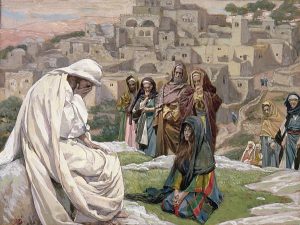We are on the 9th Sunday after Pentecost. All Sundays after Pentecost are considered as the ordinary time in the Novus Ordo. It differs in liturgical terminology. However, it refers to the same notion that right after the Resurrection of Jesus, our faith must flourish and mature, which the color green symbolically represents. We utter this Psalm 53:3 included in the Introit prayer today, “Save me, O God, by Thy Name, and deliver me in Thy strength.” (Deus in nominee tuo salvum me fac: et in virtute tua libera me.) In faith, we cannot ignore the need of our dependence and total surrender to the Lord, our Savior, for without Him we can’t do anything.
The epistle today from the first letter of St. Paul to the Corinthians expresses with clarity that Paul urges the Corinthians to learn from the mistakes of their ancestors’ unfaithfulness during which the Israelites were crossing and wandering in the wilderness of the desert. He reminded them that the chosen people’s behavior was explicitly described in verses 6 to 10. The unpleasant behaviors of the Corinthians were excessive sexual immorality and rumbling, or murmuring and complaining. It was a sort of repetition of misconduct against the mercy of God. St. Paul was concerned about the people of Corinth, which was causing great apprehension. There are possible references to each of these misconducts of the Israelites in the scriptures. It is interesting to note that these charges are pointing to a failure to be faithful to God. Perhaps, this is why Paul views that Corinthians need to be corrected because they are not only committing sins against the community, but they are sinning against Christ. (1 Cor 8:12).
This is also happening up to now, that is, the same sins of immorality and indulgence in lustful thoughts, actions, and promiscuity. We must heed the same warning of St. Paul saying, “Let no temptation take hold on you…” We are called to live in a manner that is faithful to the one who is the very source of our life and existence and living faithfully to this God, who is at the same time ever faithful.
The gospel today, taken from the evangelist Luke, gives us an idea that when Jesus entered Jerusalem, it was with great jubilation, joy and pride, indicated by the people vigorously waving the palm branches to welcome Him. People acclaimed Him with great honor and recognition expressing their desire to have a human king and leader. However, Jesus’ emotion was something different because people were standing along His path with much oppression from within themselves. That caused Jesus to weep, with deep sorrow and grief in His heart. It was then that tears began to flow from His eyes. It was an expression of sorrow towards the people of Jerusalem.
Why did Jesus succumb to despair and sadness, and He wept as He entered the city of Jerusalem?
First, Jesus has the desire that Jerusalem experience Peace. “If thou also hadst known, and that in this thy day, the things that are to thy peace.”(v. 42) This lamentation expresses that Jesus wanted peace, but it was rejected. The two words, “thy peace,” express that it was rightful for the Israelites to receive that peace. In fact, the word, “Jerusalem” means, “the City of Peace or Shalem.” King David made this city the capital of Israel about 1000 years before Christ, because of its strategic secured location against other tribes, and it allowed him to build temples. It was blessed with its own sources of water from several good springs. King David wrote this Psalm 122:6, God’s people are exhorted to “Pray for the peace of Jerusalem.” All ancient Prophets loved Jerusalem, but they also wept like Jesus because the city missed that opportunity to enjoy the gift of peace, even up until today. Jesus felt the anguish and sorrow of the city and of the nation it represents, the nation of Israel. Jesus was a Jew himself, and He prayed for His own people so that they should be blessed with peace in this world.
We believe in Jesus as God and Savior. He desires this peace so dearly for us. His weeping is an assurance that Jesus also sheds tears when we are all afflicted with difficulties because He knows and understands all of us as His children. He empathizes with our sorrows and pains.
Second, Jesus knows what awaits Jerusalem in verse 43. It was written this way, “For the days shall come upon thee, that thine enemies shall cast a trench about thee, on every side and beat thee flat to the ground.” Jesus is all-knowing God and foresees the destruction of Jerusalem in 70 AD by the Romans. According to history, Titus, the Roman General, and son of Vespasian, the Emperor, captured the city of Jerusalem and razed it to the ground. The destruction by the Roman armies was massive, and all that remained of the glorious Temple was just a wall.
I was fortunate to set foot and spend a long period of my trip to Jerusalem facing the Wailing Wall. Many Jews all over the world are praying and weeping because what remains are portions of that ancient wall still existing up to the present time for almost 2000 years. It was because they have rejected the Son of God. Although the Lord had given them the Law and sent prophets to them, they did not obey Him and seek after Him as a nation.
This gospel pericope reminds us of the ultimate cause of Jerusalem’s destruction which they failed to recognize the time of its visitation. This visitation refers to God’s visitation. It was not because they were ignorant about Salvation History, but they rejected Jesus, as God incarnate!
Let us avoid our own eternal destruction. There are many who failed to know and acknowledge the Lord. We must recognize Him in our lives and in our hearts and be sorrowful of our sins which destroy us or kill us, especially our unbelief. He knows your heart and God knows our indifference. He is grieving because of His great love for you. How much does He long for and weep for our salvation?
God bless you.
Fr. Arlon, osa

